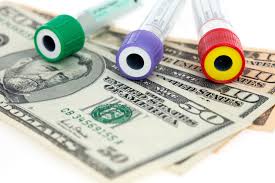Genetic Testing Through Genetic Counselors: My Experience
An excerpt from my book about my discovery of a genetic illness (in progress):
"And so the journey that will eventually take us eleven years to receive the correct diagnosis of CADASIL had begun. During those eleven years Dad had never really had a "diagnosis" and therefore he had no "prognosis". That was difficult. We just watched him get progressively sicker and sicker. And when us kids heard the positive test results in 2006 and the word "CADASIL", my immediate instinct was to run to the internet to find out just what the hell it was. The word "shock" is an understatement when I was reading the definition of CADASIL on WebMD: "Cerebral Autosomal Dominant Arteriopathy with Subcortical Infarcts and Leukoencephalopathy". WHAT?! I frantically continue reading the screen and see the word "genetic" pop-out at me. I continue to read some more and see the word "Autosomal Dominant" pop-out. Ok, I took genetics in college. But, shit, all's I remember from it was the various mutations of the drosophila. What does Autosomal Dominant mean? Then I see it; "offspring of an effected individual carry a 50/50 risk of having the defected mutation." That's it. My world had forever changed. And so, my story begins."

From this point seeing what I saw on WebMD is where I hope to offer some experience and insights. The very next step I made was to google Genetic Counselors, to determine how to get tested. I remember picking up the phone to call a large Regional Clinic, located about an hour away from me in the Central Wisconsin area. As I reached for the phone, my hands were visibly shaking and my voice was trembling. I was speaking with a Certified Genetic Counselor for the very first time. She quickly realized the person she was speaking with was in a state of shock and was very patient with me.
I expressed my concern of anonymity to her and needing to be discreet. Back then, I was allowed to make a "Jane Doe" appointment, and I paid cash. Today, my Neurologist at my current medical institution recently informed me that they can no longer offer anonymous genetic testing to their patients because of their Medical Ethics regulations. When I was tested, there were no laws in place for genetic nondiscrimination. Today, the "GINA Act" (the Genetic Information Nondiscrimination Act of 2008) is in place, so "theoretically" there should be no discrimination faced from either receiving health insurance or employment.
http://www.genome.gov/24519851 Ethically, medical institutions are obligated to record in the patient's medical history the dictation of the counseling received from the genetic counselor.
I ultimately was able to get tested anonymously through a connection at a Research Facility that I had made, but I don't think I would be able to do something like that today.

Which leads me (finally!!) to my topic for this post: getting genetic counseling. As genetic testing is evolving and becoming more affordable and readily available, more and more patients will be faced with the choice of getting tested. And I'd recommend that first step to be to find-out where a Certified Genetic Counselor is that you and your loved one can go together to meet with. The American Board of Genetic Counselors
http://www.abgc.net/ABGC/AmericanBoardofGeneticCounselors.asp is a good place to start.
When I went in for my initial appointment, my husband went with me. And I must admit, I was very anxious to speak with them. However, I was anxious about everything at this point in time. At least I was getting answers from them. CADASIL is so rare, that there was very little published information on the internet or medical journals. The counselor (a PhD) and the geneticist (a MD) were both very informative. They began explaining that there was an "approval" process that they needed to determine to see if I deemed "fit" to be tested. They explained that not all patients are advised to get testing for a condition like mine, since there were no treatments or interventions that could prevent anything. It was their job to ensure that patients wouldn't become suicidal or debilitated upon discovering their results were positive. I had to answer many questions about how I would live my life if I were to be positive. My husband had to answer their questions about the type of support that he would be able to provide, should I be positive. The hardest part was when they discussed testing my children. Ethically, the geneticist explained, my children weren't allowed to be tested until they were eighteen because they equally have the right NOT to know. Who was I to decide for them now? Maybe they will grow up and never want to know. I cannot make that decision now for them. If the genetic condition would be, for example, a heart condition that could be cured through a transplant, then yes, they would test them. But for my condition, there is really nothing preventative to do. That may change someday, in which testing them may be reconsidered.
After my "emotional fitness" was determined, the test was ordered. It is typically much cheaper and faster for an offspring of an effected individual to get testing, because they only need to test for the specific mutation that the parent possesses. When the initial patient is tested, the whole genome needs to be scanned for the defected mutation.
This is where my experience with the genetic counselors ended. As I mentioned, I was tested anonymously and the clinic could not provide that. However, if you were to be tested through genetic counselors, they would schedule a follow-up appointment to discuss your results and provide the necessary counseling on both a short-term and long-term basis.
If you're going through genetic testing, there is so much to think and worry about. Let the professionals handle some of the worry for you and your experience will be that much better.

